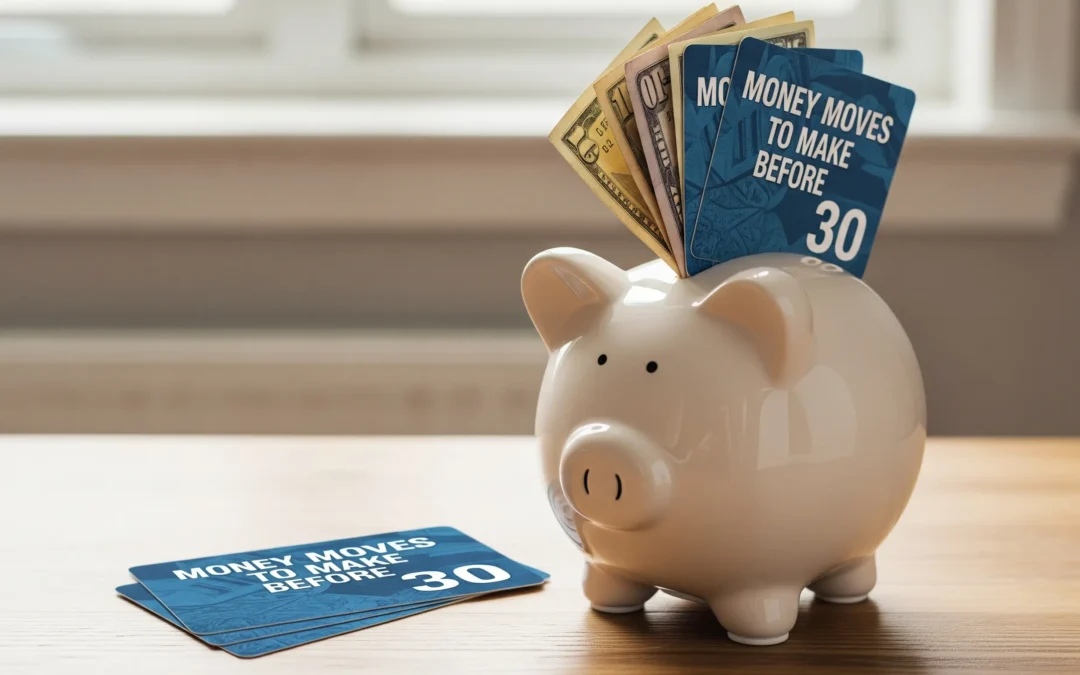A significant life milestone is entering the 30s. Your long-term stability and wealth are shaped by the financial choices you make during this decade. The secret to future financial independence is developing sound financial habits in your 20s, despite the temptation to live in the present.
Here are some of the best financial decisions you can make before turning thirty.
1. Develop a Habit of Budgeting and Stick to it
A budget is not an obligation, but surely a guide for your money. In your 30s, having a budget habit assists you in monitoring spending, managing impulses, and saving more.
Budgeting is not depriving yourself of little luxuries — it’s about getting control over your financial future. When the money coming in and going out is not monitored, it seems to vanish without a trace. Meanwhile, in mid-month, you’re wondering where your paychecks went.
- Budget helps you spend with purpose. It provides you with a clearer understanding of your cash flow, allowing you to:
- Make deliberate choices about where to trim or splurge on spending.
- Stay away from unnecessary debt by living within your means.
- Save for upcoming expenses, both planned (such as vacations or weddings) and unplanned (such as medical crises).
- Develop habitual savings, which are essential for long-term objectives such as purchasing a house or a comfortable retirement.
Example:
Assume your salary is ₹70,000/month, a simple 50/30/20 budget will improve your money management:
| Category | % of Income | Amount (₹) |
| Needs (rent, bills) | 50% | ₹35,000 |
| Wants (entertainment) | 30% | ₹21,000 |
| Savings/Investments | 20% | ₹14,000 |
Utilise budgeting tools such as Money Manager, YNAB, or a straightforward Excel spreadsheet to remain on track.
2. Create a Safety Net of an Emergency Fund
Emergencies are unavoidable, as they could be a medical crisis, a sudden loss of a job, immediate travel, or an unforeseen car repair. These surprise expenses can lead to enormous stress, especially if you’re not ready in terms of money. That’s why creating a safety net of an emergency fund is one of the wisest financial decisions to make before you reach 30.
The importance of having an emergency fund is as follows:
- It minimizes your use of credit cards or loans in times of need.
- It makes you feel confident enough to make large life choices (such as leaving a bad job) without worrying about money.
- It establishes an early foundation for good money habits.
A rule of thumb is to save 3 to 6 months’ worth of basic expenses. These are rent, groceries, utilities, insurance, transport, and other living expenses. For instance, if your monthly basics amount to ₹25,000, target a fund of ₹75,000 to ₹1,50,000.
3. The earlier you start better the Savings
Investing early and consistently is one of the best financial choices you can make in your 20s. Many young adults delay investing because they believe it requires a high income, deep financial knowledge, or large initial sums. In reality, starting early is more important than how much you invest, because time in the market matters more than timing the market.
By beginning early, your investments benefit from the power of compounding, where your returns start generating their own returns over time. The longer your money is invested, the more exponential your growth will become.
Example: Assuming 12% Annual Returns
| Starting Age | Monthly Investment | Value at Age 45 |
| 25 | ₹5,000 | ₹38.3 Lakhs |
| 30 | ₹5,000 | ₹23.2 Lakhs |
From the example, it can be seen that just a 5-year head start results in over ₹15 lakh more, without investing a single extra rupee. That’s the power of compounding at work.
4. Focus on Your Credit Score
It’s easy to overlook your credit score in your twenties—until you apply for a loan or credit card and realise how crucial it is. Your credit score is not just a number; it reflects your financial health and strength. Lenders use it to assess how likely you are to repay borrowed money, and it directly affects the interest rates, loan approvals, and credit limits you’re offered.
A higher credit score will give you significant financial advantages. A score above 750 is generally considered excellent and offers benefits such as:
- Faster approvals for personal, auto, and home loans
- Eligibility for higher credit limits
- Lower interest rates, reducing borrowing costs
- Access to premium credit cards and financial offers
Example: Let us see the impact of credit score on a ₹10 lakh loan over 15 years.
| CIBIL Score | Interest Rate | Monthly EMI (Approx.) | Total Interest Paid |
| 780 (Excellent) | 8.2% | ₹9,700 | ₹7.4 Lakhs |
| 650 (Average) | 10.5% | ₹10,950 | ₹9.7 Lakhs |
5. Have a Passive Source of Income
Starting a side business in your 20s is a game-changer if you want to accelerate your financial growth, achieve early financial freedom, or just build a buffer against uncertainty. The current needs may be met by relying only on a 9-to-5 salary, but in your 30s, you will need a passive source of income.
In addition to improving financial security, having several sources of income allows you to explore your interests, learn new skills, and take advantage of opportunities that your full-time job might not present.
Some ideas for having other income streams are:
- Freelance work in writing, design, and coding
- Online product reselling or drop shipping
- YouTube or blogging
- Teaching a skill online (Udemy, etc.)
Bottomline
Building solid financial foundations is very important. You thrive rather than just survive if you set clear goals, avoid debt traps, invest early, and budget wisely. The financial decisions you take now will have an impact on your 30s, 40s, and beyond.
Thus, begin now. Your future self will appreciate it.
Written by: Tanya Kumari


